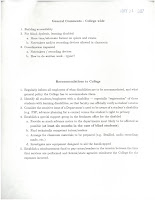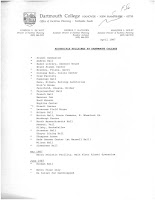 "It is the responsibility of the College to supply whatever assistance is required in order to reasonably and adequately respond to the needs of the handicapped in our courses." - Richard H. Crowell, Chair of the Department of Mathematics and Computer Science, March 16, 1987
"It is the responsibility of the College to supply whatever assistance is required in order to reasonably and adequately respond to the needs of the handicapped in our courses." - Richard H. Crowell, Chair of the Department of Mathematics and Computer Science, March 16, 1987Since 1976 and the codification of Section 504 of the Rehabilitation Act of 1973—a precursor to the Americans with Disabilities Act that required educational institutions to make significant changes to internal policies and physical plants as a measure of providing equal opportunity for the differently abled— the College had undergone a series of changes to comply with the legislation. As with any institutional change, the College had significant successes and some failures. It was the job of the Section 504 Committee— an administrative standing committee to review the College’s compliance with legislation regarding institutional accessibility for the differently abled established in 1986 — to help the College improve its compliance. In February of 1987, the members of the Committee sent out a series of requests to department chairs for departmental self-evaluations.
What is most apparent in these self-evaluations is the extent to which the professors at Dartmouth College thought critically about and did their best to accommodate the differently abled. It is also apparent that some departments vastly underestimated the ability of persons with impairments.
 The Drama department submitted one of the most lengthy, in-depth self-evaluations. While they did comment that "the success of an actor is determined far more by inner qualities than by any handicap," they also remarked that numerous courses would be "inappropriate" for students with ambulatory, sight, and hearing problems. Non- and semi-ambulatory individuals and individuals with vision impairments would not be recommended to take dance, lighting, or costume design courses. It is not clear whether the department would prevent a differently abled student from taking these classes. It is clear that the department was incorrect with their assumption that the differently abled would be incapable of taking these courses— there are low-vision dancers, students in wheelchairs very capable of learning costume design and history, and actors with lupus who have successfully taken lighting courses at this very college with minimal accommodations.
The Drama department submitted one of the most lengthy, in-depth self-evaluations. While they did comment that "the success of an actor is determined far more by inner qualities than by any handicap," they also remarked that numerous courses would be "inappropriate" for students with ambulatory, sight, and hearing problems. Non- and semi-ambulatory individuals and individuals with vision impairments would not be recommended to take dance, lighting, or costume design courses. It is not clear whether the department would prevent a differently abled student from taking these classes. It is clear that the department was incorrect with their assumption that the differently abled would be incapable of taking these courses— there are low-vision dancers, students in wheelchairs very capable of learning costume design and history, and actors with lupus who have successfully taken lighting courses at this very college with minimal accommodations.STEM departments were often great advocates for disabled students at the College. Each STEM department’s self-evaluation emphasized that "it should be understood that the fundamental policy of the division is that a concerted effort will be made to accommodate any and all disabled students in all departments and courses within those departments." The Math department spoke in great detail about how professors in the department committed large amounts of time converting course material into appropriate formats for deaf and blind students. This entailed, in some cases, reading textbooks to a recorder. The Math and Social Science Program chair also wrote passionately about"one of the best and most exciting students" he ever taught— a student who was deaf from birth. The chair gave a detailed account of how this student gave "one of the finest oral reports for his term project [he had] ever experienced," and how this student improved his teaching quality by giving pointers on how to more effectively communicate.

The Department of Anthropology had similar stories of how faculty members have historically accommodated disability— in Winter 1987, one professor, without any official policy or urging from the administration to do so, accommodated a blind student by allowing the student to tape lectures, spending numerous hours taping exams, and consulted with the student’s mother on finding substitutes for the course’s textbook that was not available in braille.
Language departments emphasized their frustrations with the College's accessibility and the inaccessibility of most of their classrooms. The French and Italian department was particularly blunt about this, and went so far as to comment that "even a student would have difficulty opening the doors of [Dartmouth Hall]." More importantly, the department acknowledged its inability to truly complete a sufficient review of their own programs. Members of the department felt that because they had not been trained in teaching to students of different abilities that any curriculum evaluation would be "at best, the work of well-intentioned amateurs." All of the humanities departments shared concerns about the physical accessibility to faculty offices and classrooms.
 Members of the Education department, somewhat ironically, extended their evaluation beyond the classroom. They spoke about the need for the College to make more dormitories, fraternities, and sororities accessible and expressed outrage that the College was sponsoring affinity housing for Russian, Women's Studies, and Educational Studies on the fourth floor of the East Wheelock cluster— a cluster without elevator access. They urged the College to be proactive and acknowledged the "substantial commitment" required from all members of campus to truly make Dartmouth College accessible to all people of different physical abilities.
Members of the Education department, somewhat ironically, extended their evaluation beyond the classroom. They spoke about the need for the College to make more dormitories, fraternities, and sororities accessible and expressed outrage that the College was sponsoring affinity housing for Russian, Women's Studies, and Educational Studies on the fourth floor of the East Wheelock cluster— a cluster without elevator access. They urged the College to be proactive and acknowledged the "substantial commitment" required from all members of campus to truly make Dartmouth College accessible to all people of different physical abilities.While Dartmouth has most certainly undergone several changes throughout its history, our faculty have remained excellent. We are lucky to have educators that are willing to go out of their way to accommodate students. The positive sentiments mentioned in these self-evaluations are most certainly not commonplace. Nor can I say that every professor will be equally good at accommodating students. But it is my hope that bringing these self-evaluations into public knowledge will both acknowledge and honor the substantial effort put forth by many faculty members to make the College accessible.
 If you would like to read the Section 504 Committee Department Self-Evaluations yourself, come to Special Collections and ask for the Records of the Office of Planning, Design and Construction (DA-643), Box 651, "Handicapped Access 1987–88 Facilities Planning".
If you would like to read the Section 504 Committee Department Self-Evaluations yourself, come to Special Collections and ask for the Records of the Office of Planning, Design and Construction (DA-643), Box 651, "Handicapped Access 1987–88 Facilities Planning".Posted for Samantha Koreman '20, recipient of a Historical Accountability Student Research Fellowship for the 2019 Winter term. The Historical Accountability Student Research Program provides funding for Dartmouth students to conduct research with primary sources on a topic related to issues of inclusivity and diversity in the college's past. For more information, visit the program's website.